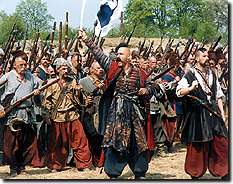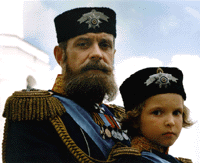 |
Vol 0, No 37
7 June 1999 |
|
|
 K I N O E Y E:
K I N O E Y E:The Empire Strikes Back The revival of nationalist epics in cinema Andrew J Horton Large-scale cinema is truly making a comeback. In America, breakthroughs in computerised special effects have unleashed a whole generation of high-tech Cecil B de Milles. While Hollywood films are the ones to rake in the cash universally, their dominance is not absolute in Central Europe. Jerzy Hoffman's Ogniem i mieczem (By Fire and Sword, 1999) and Nikita Mikhalkov's Sibirskij tsirjulnik (The Barber of Siberia, 1998) are two films made in direct opposition to American cinema, and yet they still retain some curious similarities in their underlying concept. The rapture which greeted Ogniem i mieczem and Sibirskij tsirjulnik in their homelands has been immense. Both films have been commercial successes of the sort that producers of Hollywood blockbusters can only fantasise about; each beat out that paragon of late nineties box office success - James Cameron's Titanic - at Polish and Russian cinemas respectively. Not only that, the critics seem to be in rare agreement with the viewers. Gazeta Wyborcza, the respected Polish daily, even considered Ogniem i mieczem to be of "national importance". The golden era The success of both films lies in their epic scale and concentration on historical events which recreate Poland and Russia's more glorious years. Ogniem i mieczem is based on the nineteenth century Polish literary classic of the same name by Nobel prize-winning author Henryk Sienkiewicz. Hoffman's name has been intimately connected with that of Sienkiewicz, ever since he made Pan Wolodyjowski (Mr Wolodyjowski, 1967-69) and Potop (Deluge, 1974) - adaptations of the third and second parts of the trilogy of which Ogniem i mieczem forms the first book. These two films, made during the Communist era when national pride was at a low point, won Polish hearts with depictions of the Polish-Lithuanian Commonwealth, considered by Poles to be the golden era of their history. Throwing off the Communist yoke seems to have done little to suppress Poles' desire for this "prequel". Especially since the scale of the film is in proportion to the power and might of mediaeval Poland. Over a decade in the making and lasting three hours, the film is the most expensive in Polish cinema history.
Russians adored the film, but critics at Cannes, where the film was the opening feature, were less than enthusiastic. Indeed, many walked out long before the film's end. One who left early described it as "the longest political broadcast in history". Milkhalkov and actor Richard Harris have, however, blamed the film's lack of international success on the three-hour edited version, which the film's co-star described as seeming longer than the six hours of the original. Shutter diplomacy Ogniem i mieczem has also met with a cooler international response. While the Polish-Lithuanian Commonwealth might have been a high point in Polish history, other nationalities who came under joint Polish-Lithuanian rule in that time view the era rather differently. Even Lithuanians see the time as one of Polish domination, and the Ukrainians - who didn't even have the pretence of being equal partners - view it even less favourably. The novel portrays Polish rule as being a Central European "white man's burden", with the Poles trying to civilise an uncouth and backward barbarian nation.
Saga sells It can hardly be surprising that these films are being made at this time. A comparison with American cinema in this context is instructive. Hollywood has previously been reticent to let a film run much over 90 minutes for fear it would reduce the number of times the film could be shown in one evening. However, in recent years, it has become clear that the disadvantages of fewer showings can be overcome with higher audience figures. Titanic and The English Patient, both visually captivating love stories, have proved their profitability despite having running times of around three hours each. This almost Wagnerian love of the large scale is also reflected in the Hollywood fascination with sequels. Previously, this interest was not always shared by audiences and even less so by critics. However, in the last few weeks, audiences have been clamouring to see The Phantom Menace, the fourth of six planned films spawned by the original success of George Lucas's Star Wars, which will become the fourth episode in the saga. The hysteria surrounding this film is describable as anything between religious and "mass nerd psychosis", with audiences having paid just to see a trailer for the movie and box office records already being broken. The intensity of feeling surrounding the film has been curiously unmarred by the film's lack-lustre performances, uninspired plot and over-dependence on special effects. This might have something to do with the fact that, following the death of the western, science fiction is America's foremost genre for nationalist sentiments. Armageddon and Independence Day are the ultimate wet dream for American nationalists, with the US saving the world from a flying lump of rock and bug-eyed monsters respectively. In the latter film, American culture nauseatingly becomes global culture when the iconic day of American identity - the Fourth of July - comes to be celebrated by all peoples of the world as a day of American-led liberation. Even in Apollo 13, America is depicted as the glorious conqueror of the vast unknown beyond our atmosphere. The Phantom Menace, like all the Star Wars films, is no less a homage to white middle-class American values and their superiority over the forces of evil. In fact, The Phantom Menace's pro white America message is so strong that some American critics have questioned the film's moral probity, denouncing it as racist. Grandeur and patriotism It is perhaps ironic then that both Ogniem i mieczem and Sibirskij tsirjulnik, while conceived as reactions to American cinema, are actually in tune with it in terms of grandeur and patriotism. These two Central European films draw on history and literature, whereas American nationalist cinema draws on fantasy and comic book stories. Both categories, however, are essentially lavish large-scale costume dramas which evoke another time, when their respective national values were or will be greater than they are now. This is neither to praise nor condemn these films, for their effects could be argued both ways. They may be damagingly arrogant assertions of national superiority or they may play a vital role in forming and maintaining a consensus of national memories and values in society. But then again, they could just be immensely enjoyable to watch. Andrew J Horton, 7 June 1999 (republished 29 November 1999)
|
|
![]()
Copyright (c) 1999 - Central Europe Review and Internet servis, a.s.
All Rights
Reserved
 Nikita Mikhalkov's film is no less epic in proportion. Its running time of six hours compensates for any grandeur lost in not being part of a trilogy. Depicting the reign of Tsar Alexander III, played by the director himself, Mikhalkov's aim is to show a strong Russia which can stand on its own two feet - a fitting film for a time when the Russian economy could well be about to vanish down the plug-hole.
Nikita Mikhalkov's film is no less epic in proportion. Its running time of six hours compensates for any grandeur lost in not being part of a trilogy. Depicting the reign of Tsar Alexander III, played by the director himself, Mikhalkov's aim is to show a strong Russia which can stand on its own two feet - a fitting film for a time when the Russian economy could well be about to vanish down the plug-hole.  The film attempts to avoid the jingoism of the book, written to console the Poles during a period when their country didn't even exist. However, the film comes at a time when Polish-Ukrainian relations are already tense and any recreation of Sienkiewicz's novel, no matter how sensitively made, is bound to infuriate Ukrainians. Even the Polish president Aleksandr Kwasniewski requested an early viewing of this politically sensitive film to see the potential damage it might cause.
The film attempts to avoid the jingoism of the book, written to console the Poles during a period when their country didn't even exist. However, the film comes at a time when Polish-Ukrainian relations are already tense and any recreation of Sienkiewicz's novel, no matter how sensitively made, is bound to infuriate Ukrainians. Even the Polish president Aleksandr Kwasniewski requested an early viewing of this politically sensitive film to see the potential damage it might cause.